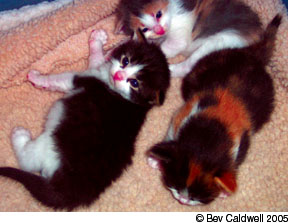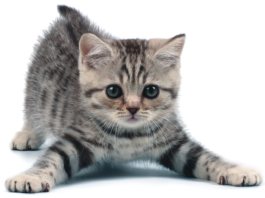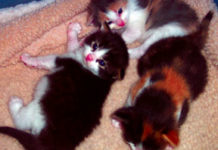Treating Infectious Peritonitis; Cornell Study on Anesthesia
Feline infectious peritonitis, or FIP, a viral disease that is nearly 100 percent fatal, has been successfully treated in a research project at Kansas State University. Collaborators in diverse fields developed an antiviral compound for the feline coronavirus associated with FIP. Manuel Martin-Flores, MV, , ACVAA, of the Cornell University College of Veterinary Medicine will present preliminary results of his research on safer anesthesia for cats at the annual meeting of the American College of Veterinary Anesthesia and Analgesia in September. Dr. Martin-Flores is one of only 220 anesthesiologists board-certified worldwide by the college.
Should Cats With Coronavirus Be Separated?
I have six adult cats and I am keeping them all separated from one another for fear of coronavirus infection and the development of feline infectious peritonitis (FIP). I have had multiple cats tested for coronavirus, and some are positive. Should I be keeping those who have tested positive isolated from the others, and how should I manage this group of cats?
Grants to Study FIP and Other Diseases
Investigations into potential treatments for feline infectious peritonitis (FIP), hypertrophic cardiomyopathy and chronic kidney disease were among ten projects selected by the Winn Feline Foundation from 44 proposals to receive $174,018 in funding. The investigation by Belgium researchers to evaluate the efficacy of a treatment for feline infectious peritonitis received the most funding at $24,962.
A Greater Understanding of FIP Treatment
Feline infectious peritonitis (FIP) has long been a difficult diagnosis with little hope. But a new medication shows promise — and a cutting-edge genetic breakthrough may also be within reach. This progress was announced to 200 veterinarians, cat breeders and cat lovers at the 33rd annual Winn Foundation Symposium in Reston, VA.
Panleukopenia: A Lethal Threat
Among all agents of feline illness and mortality, few if any are more pernicious — especially to kittens — than feline panleukopenia virus (FPV). The disease is also known in some circles as “distemper,” a misnomer, notes Fred Scott, DVM, PhD, a professor emeritus of virology in Cornell University’s College of Veterinary Medicine and founding director of the Cornell Feline Health Center. ”Distemper” refers to a respiratory disease, and there is no respiratory component to feline panleukopenia. Cats become infected with FPV — which is classified as a parvovirus — by living in an environment that is contaminated with it or by coming in contact with the urine, feces, saliva or nasal secretions of a cat that is already infected.
Short Takes: July 2011
Thanks to the development of screening assays and vaccines for FeLV, the prevalence of persistently infected cats has decreased. Recent studies indicate that the FeLV genetic material remains in cats exposed to the virus, though viral replication may not occur. Concern exists that this persistent viral DNA may ultimately contribute to development of lymphoma in cats.
Diagnosis: FIP
FIP: Almost always fatal. Owners can reduce the risk of this serious feline disease by practicing good litter-box hygiene. Here's why.
Silent, But Deadly: Feline Infectious Peritonitis
This fatal disease is difficult to diagnose and impossible to treat. We explain why.
Diagnosis: Feline Infectious Peritonitis
This is a lethal and incurable disease thats made worse by its difficult diagnosis.
What You Should Know About FIP
Rare in single cat homes, its danger increases in overcrowded feline conditions.
Ask Dr. Richards: 01/04
Question: I bought a sweet, purebred kitten from a breeder. The kitten seemed healthy at first, but he soon became ill. He had feline...













